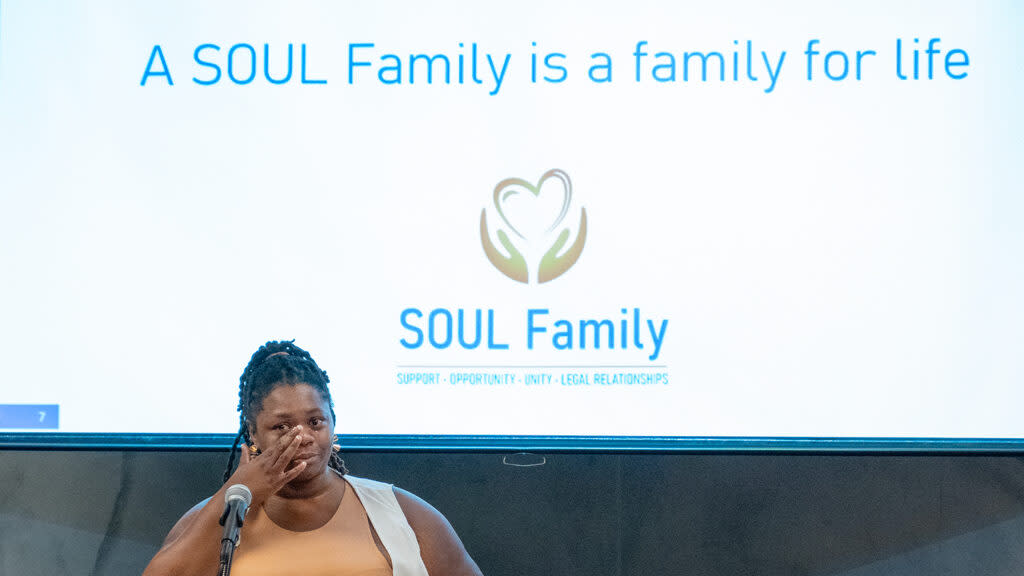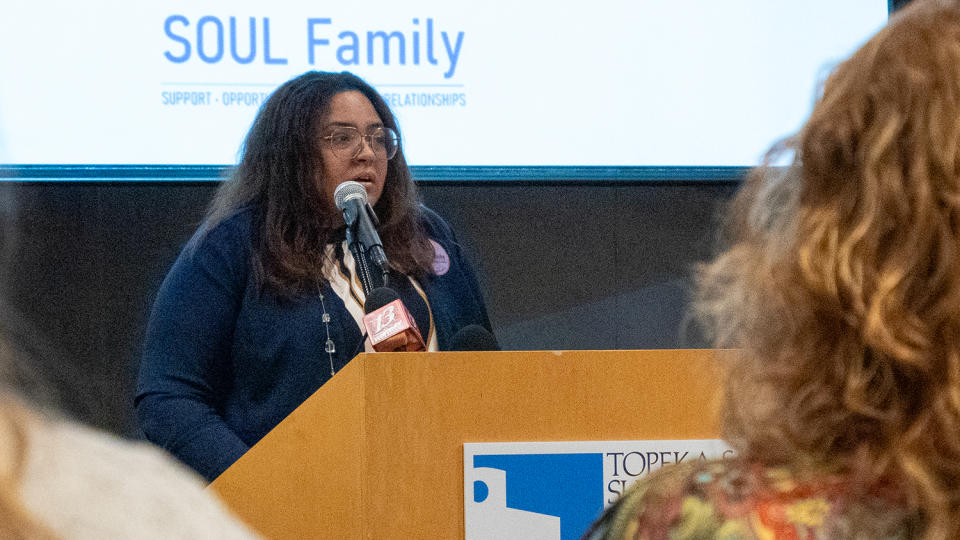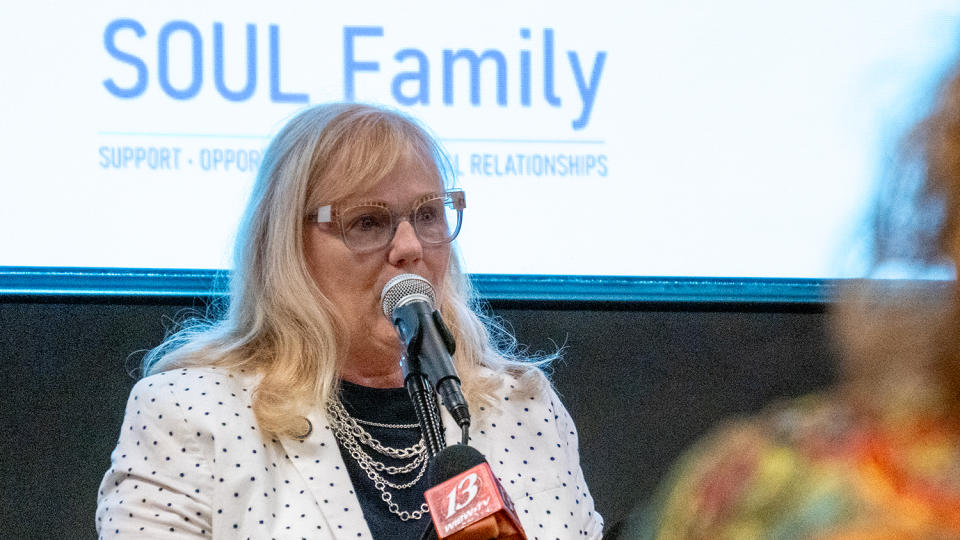Former foster kids relived trauma, fought for new program and compelled Kansas lawmakers to act

Alexandria Ware, a veteran of the Kansas foster care system, wipes away tears while speaking May 14, 2024, at the Topeka and Shawnee County Public Library during a celebration of SOUL Family legislation. The law provides a new placement option for foster kids who are 16 or older by allowing them to choose a caretaker. (Sherman Smith/Kansas Reflector)
TOPEKA — Two years ago, Alexandria Ware and other alumni of the Kansas foster care system met with state officials and contractors to present a novel plan for providing stability to foster kids as they age out of the system and enter adulthood.
“We were in a room where all of us did not like what we were being told at all,” Ware recalled Tuesday.
But with support from the Annie E. Casey Foundation and through the power of personal stories, the former foster kids prevailed. On Tuesday, they celebrated the passage of legislation that will allow foster kids who are 16 or older to choose to stay with a family member or close friend — as opposed to bouncing from one temporary house to another or sleeping in office space while waiting for adoption.
“I’m not normally a crier, but this is the biggest impact that all of us could leave,” Ware said during the celebration at the Topeka and Shawnee County Public Library, where she spoke alongside peers who helped develop the program, as well state officials and legislators.
“We did this,” Ware said. “We worked together. We had to relive our trauma. We had to sit in rooms and be uncomfortable. But this has shown the progress of Kansas being able to listen to young people.”
SOUL stands for Support, Opportunity, Unity and Legal Relationships. Entry into the program would require approval from the foster child, the child’s parent, the chosen caretaker and a judge.
The caretaker would receive financial support, and the teenager would continue to receive state services like other foster kids. Instead of aging out of the system when they turn 18, those enrolled in the SOUL Family program would receive support for health care, education and housing.
Carol Roberts, one of the former foster kids who helped develop the program, said House Bill 2536 signifies a shift toward empowering young people to have a voice in decisions that will shape their lives. Traditionally, she said, their lives are controlled by judges and social workers.
“While I wish this had been a reality when I was in the system, I found solace in knowing that the present and future youth will no longer feel powerless,” Roberts said. “They will have a chance to express their needs, share the importance of connections, and navigate their journey with less trauma and uncertainty.”
The bill won unanimous support in the Senate, where it passed 40-0 after clearing the House by a 112-8 margin.
The rare bipartisan support for legislation dealing with social services followed deeply personal testimony from former foster kids. Rep. Susan Concannon, a Beloit Republican who serves as chairwoman of the House Child Welfare and Foster Care Committee, said the “narratives of resilience and yearning” compelled lawmakers to act with purpose and urgency.
“It’s one thing for us to sit in a committee room and talk about what’s in the best interest of the child, and we we create laws,” Concannon said. “But to have the people who are living it come and talk to us — some of it is hard to hear. Some of it shows a lack of common sense: What are we doing here?”
The program will attempt to alter the lives of a segment of foster kids who, because of their age, are more vulnerable to the instability that has plagued the Kansas foster care system for much of the past decade.
The volume of children in the foster care system surged during former Gov. Sam Brownback’s administration after he and the Legislature imposed severe restrictions on food assistance for low-income families. The state didn’t have enough homes or resources to support the foster kids, and secretly withheld payments to contractors, facilitating severe instability and a dramatic increase in missing children — especially teenagers who were trafficked for sex.
Under Gov. Laura Kelly, the number of kids in foster care has declined by 20%, and the Legislature has worked to provide additional resources for the child welfare system. The Kelly administration also settled a lawsuit with Kansas Appleseed that requires the state to improve aspects of the foster care system, although the state has struggled to make sufficient progress.
Kelly said the SOUL Family program is a tool that will help reduce the number of young adults who struggle when they age out of the foster care system. She thanked the Annie E. Casey Foundation for trusting Kansas to be the first state to implement the program.
“Kansas is leading the way in bringing about positive changes to the foster care system, and we have an opportunity to change lives in a tremendous way,” Kelly said.
The Department for Children and Families, in conjunction with Mainspring Consulting, estimates 91 foster kids will enroll in the program in the first year it is implemented, and 135 in year two. A revised calculation lowered the expected cost of the program in the second year from $2.4 million to about $800,000.
During testimony earlier this year, Ware said she went through at least 55 different placements while in state custody. In an interview Tuesday, she said foster kids endure pain and trauma.
But she offered advice to those who are currently in the system.
“Keep advocating for yourself. Stand strong. Stand tall,” Ware said. “There’s people out here who want to help you, people with lived experience. Finesse the system. If someone’s offering you benefits or any of that, take advantage of it. Take advantage of everything they have to offer you. I mean, I know it’s hard. I know it’s painful to have to continue to work with with them. But those benefits are there for you.”
The post Former foster kids relived trauma, fought for new program and compelled Kansas lawmakers to act appeared first on Kansas Reflector.



